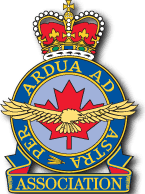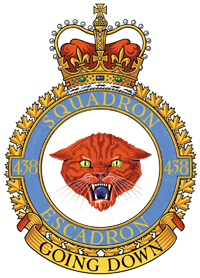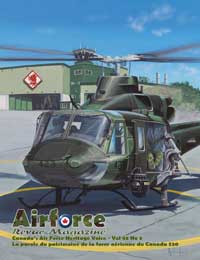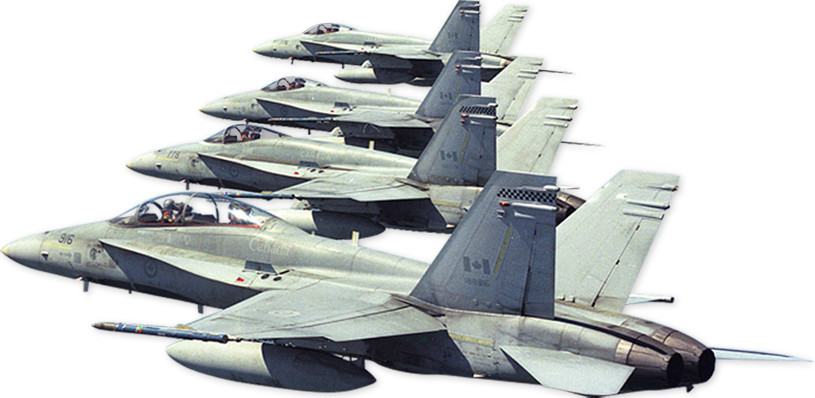 No. 438 Squadron
No. 438 Squadron
Badge: The head of a wild cat affronte
Motto: Going down
Authority: King George VI, October 1945
The wild cat represents the squadron’s nickname. The motto is taken from the last instructions of the formation leader when Typhoon fighter bombers of this unit were about to attack.
Formed in Canada as No. 118 (Fighter) Squadron on 13 January 1941, the unit was the first of six home squadrons transferred overseas (complete in personnel but without aircraft) in preparation for the Allied invasion of Europe, and was redesignated No: 438 (Fighter Bomber) Squadron at Digby, Lincolnshire, England on is November 1943. It flew Typhoon aircraft in the pre-invasion softening up of the German defenses and, after D-Day, gave close support to ground forces by dive-bombing and strafing enemy strong points, bridges, rail and road traffic. The squadron was disbanded at Flensburg, Germany on 26 August 1945.
Brief Chronology: Formed as No. 118 (F) Sqn, Rockcliffe, Ont. 13 Jan 41. Redesignated No. 438 (FB) (1) Sqn, Digby, Lincs., Eng. 18 Nov 43. Disbanded at Flensburg, Ger. 26 Aug 45.
Title or Nickname: “Wild Cat”
Adoption:City of Montreal
Commanders
- S/L F.G. Grant, DFC 18 Nov 43 – 28 Jul 44.
- S/L J.R. Beirnes, DFC 29 Jul 44 – 13 Oct 44 2OTE.
- S/L R.F. Reid 14 Oct 44 – 29 Dec 44 OTE.
- S/L P. Wilson 30 Dec 44 – 1 Jan 45 KIA.
- S/L J.E. Hogg, DFC 20 Jan 45 – 23 Mar 45 KIA.
- S/L J.R. Beirnes, DFC 6 Apr 45 – 1 Jun 45 KIFA.
- S/L P. Bissky 4 Jun 45 – 26 Aug 45.
Higher Formations and Squadron Locations
Air Defence Great Britain:
No. 12 Group,
- Digby, Lines. 20 Nov 43 – 18 Dec 43.
- Wittering, Leics. 19 Dec 43 – 9 Jan 44.
Second Tactical Air Force:
No. 83 (Composite) Group,
No. 22 (RCAF) Sector (disbanded 13 Jul 44),
No. 143 (RCAF) Wing,
- Ayr, Scot. 10 Jan 44 – 17 Mar 44.
- Hurn, Hants. 18 Mar 44 – 2 Apr 44.
- Funtington, Sussex 3 Apr 44 – 19 Apr 44.
- Hurn, Hants. 20 Apr 44 – 26 Jun 44.
- B.(Base) 9 Lantheuil, Fr. 27 Jun 44 – 30 Aug 44.
- B.24 St Andre, Fr. 31 Aug 44 – 2 Sep 44.
- B.48 Glisy, Fr. 3 Sep 44 – 5 Sep 44.
- B.58 Melsbroek, Bel. 6 Sep 44 – 25 Sep 44.
- B.78 Eindhoven, Neth. 26 Sep 44 – 18 Mar 45.
No. 17 Armament Practice Camp, Warmwell, Dorset., Eng. 19 Mar – 2 Apr 45.
- B.100 Coch, Ger, 3 Apr 45 – 11 Apr 45.
- B.110 Osnabruck, Ger. 12 Apr 45 – 20 Apr 45.
- B.150 Hustedt, Ger. 21 Apr 45 – 28 May 45.
- B.166 Flensburg, Ger. 29 May 45 – 26 Aug 45.
Representative Aircraft (Unit Code F3)
Hawker Hurricane Mk.IV (Nov 43 – May 44 – not on operations)
- LD 973
Hawker Typhoon Mk.IB (Jan 44 – Aug 45)
- DN619 G EK383 N EK481 H JR135 J MM959 B MN283 L MN345 D MN375 W MN398 A MN424 S MN547 Q MN626 A MN758 M RB391 Y RB407 T SW398 E SW414 G
Operational History: First Mission 20 March 1944, 4 Typhoons from Hurn – fighter sweep Cherbourg-Alderney; strafed a German staff car and troops without observed results.
Last Mission: 4 May 1945, 8 Typhoons from Hustedt armed with two 500-pound bombs – anti-shipping strike in Kiel Bay, attacked a 1000-ton vessel. No bomb hits, but cannon fire hits were observed during strafing runs.
Summary Sorties: 4022.
- Operational/Non-operational Flying Hours: 4515/3961.
- Victories:
- Aircraft: 2 destroyed, 1 damaged.
- Ground: dropped 2070 tons of bombs (2537 1000- and 3205 500-pound) and credited with 430 rail cuts; destroyed/damaged 184/169 motor vehicles, 12/3 tanks, 5/73 locomotives, 101/532 trains, 1/38 barges, 5/0 bridges.
- Casualties:
- Operational: 28 aircraft; 31 pilots, of whom 17 were killed, 5 missing, 6 POW; 3 proved safe.
- Non- operational: 3 personnel killed.
Honours and Awards: 5 DFC’s.
Battle Honours:
- Fortress Europe 1944.
- France and Germany 1944-1945: Normandy 1944, Arnhem, Rhine.
(1) The abbreviation “FB” for “Flying Boat” had been discontinued at the outbreak of the Second World War. Here. and later, “FB” is the abbreviation for “Fighter Bomber.”‘









